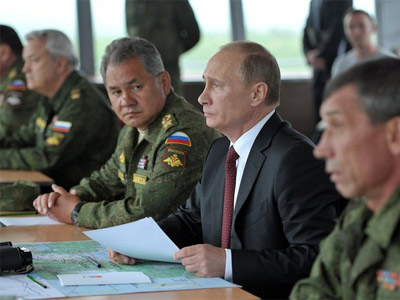Russia Is Back
Russia's role in the Syria deal makes it appear more powerful. It's an illusion Obama shouldn't encourage.
 President Obama has accepted an exit strategy from the Syria crisis proposed by Vladimir Putin. Obama surmised that if the plan works, it might lead to a breakthrough. In his Tuesday speech to the nation last week, Obama indefinitely postponed a crucial Congressional vote on whether to strike the Syrian dictator Bashar al-Assad. No wonder: Obama most probably would have lost that vote. By Saturday, he agreed to a deal negotiated by John Kerry and Sergey Lavrov in Geneva.
President Obama has accepted an exit strategy from the Syria crisis proposed by Vladimir Putin. Obama surmised that if the plan works, it might lead to a breakthrough. In his Tuesday speech to the nation last week, Obama indefinitely postponed a crucial Congressional vote on whether to strike the Syrian dictator Bashar al-Assad. No wonder: Obama most probably would have lost that vote. By Saturday, he agreed to a deal negotiated by John Kerry and Sergey Lavrov in Geneva.
This was hardly a glorious case of presidential crisis management. Many influential Senators—including Democrats—would have opposed authorizing force. The House was clearly against the President. A majority of American voters, exhausted by the wars in Afghanistan and Iraq, did not support the strike, and Congressional elections are only a year away.
Obama seemed to have climbed up the proverbial tree, and it was Russian President Vladimir Putin who played a crucial role in providing him a ladder to climb down—at a price. Thus, Putin, in a typical geopolitical “judo” move, stepped closer to Obama—in order to neutralize him politically. By providing a way out for the American president from a perceived tight corner, Putin made himself appear more powerful. And the optics matter as much as substance.
In a tactically impressive move, Putin, ever eager to assert Moscow’s role in the Middle East and oppose the U.S. and her Sunni allies, including Saudi Arabia, Qatar, and the UAE, offered to put Syria’s chemical arsenal under UN control and then destroy it under international supervision. Damascus has joined the Chemical Weapons Convention and signaled consent to the Putin plan.
In what appears as yet another strategic blunder, Obama even elected to forego a binding UN Security Council resolution on Syrian disarmament under Chapter VII of the UN Charter, which allows for enforcement, while Putin may hit the geopolitical jackpot.
If the disarmament initiative succeeds, Obama will “owe” Putin. America will be enticed to forget quickly the damage caused by the NSA and CIA defector Edward Snowden, who received asylum in Russia. America will remain mum as a Russian court has sentenced anticorruption crusader and whistleblower Alexei Navalny. Moscow is rife with rumors about preparations for the third trial of jailed oil tycoon and political opponent Mikhail Khodorkovsky. It is equally unlikely that Russia’s ambitious plans to expand the Eurasian Union to include Armenia and Ukraine into the Customs Union will meet a vigorous U.S. response.
Obama may not realize that Putin, a former KGB recruiting officer, seems to have played him like a violin. Putin has demonstrated that he is capable of stopping the world’s only superpower from using force—making him “the go to” man, to whom many on the U.S. blacklist will run to seek protection.
Putin will also have demonstrated that Russia, despite being seven times smaller than the U.S. economically, and weaker militarily, is capable of gaining impressive geopolitical results even when dealt a poor hand. As the military operation against Assad is postponed, Putin has increased the chances of the pro-Iranian regime’s survival, and possibly ensured the continued presence of a modest Russian naval facility in Tartus.
Moscow also has a growing interest in a Shia strategic belt extending from Lebanon via Syria and Iraq to Iran, as it prevents Sunni radicals from flooding into the North Caucasus and Central Asia—Russia’s soft underbelly.
Moscow also sent a signal that a U.S. military operation against the Iranian nuclear program may not happen—without the UN Security Council—i.e., the Kremlin’s—sanction. And that sanction will not be forthcoming.
Not bad for a week’s work.
It appears that at least for now, Russia is winning a zero-sum game—the Kremlin’s favorite geopolitical sport.
The Kremlin is boosting its status as the great balancer of America. This benefits Moscow—and further encourages it to stand up to America.
Ariel Cohen, PhD, is Senior Research Fellow in Russian and Eurasian Studies and International Energy Policy at the Heritage Foundation.
